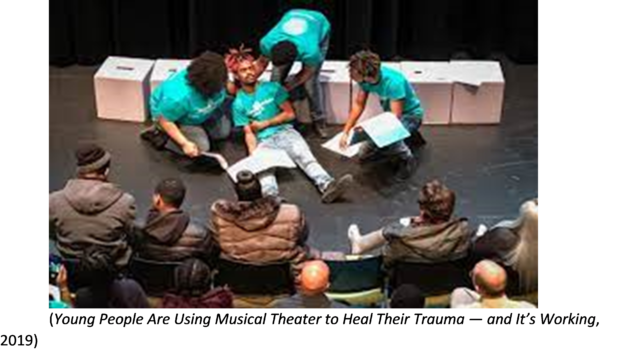Trauma Theater: Real Therapy or Fun Fiction…
Before I begin explaining my understanding of Trauma Theater, I must first begin with a little history on how I learned of trauma theater. I recently learned of a trauma-based therapy that utilized theater as a means of coping with trauma. In the book, “The Body Keeps the Score” (van der Kolk, 2014) Dr. Van Der Kolk discusses his positive experiences with theater-based trauma therapy and even discusses how it helped his son following a mysterious illness.
There is little information about exactly when this form of therapy started or who pioneered it, but one thing I found to be certain was that this therapy method is alive and well. It seems to be consistently used with troubled adolescents and veterans suffering from PTSD but can also be applied to others suffering from a traumatic incident. Historically speaking it may date as far back as Shakespeare and his utilization of trauma to create while writing his plays. Dr. Van Der Kolk discusses in his book that he learned about it from a group of veterans he had been treating for PTSD and how he discovered that the theatrical production was a part of the recent positive changes he observed during therapy with these veterans.

Dr. Van Der Kolk’s book is what first introduced me to this type of therapy and although I found it to be an interesting process, I did notice that a majority of the programs discussed in the book or on the internet reside on the east coast of the U.S. I have no doubt some also exist on the west coast, but since I have mostly lived in Colorado I had never heard of this therapy. Naturally, I was a little skeptical of the process and had difficulty seeing how it would apply to me or anyone I know who has experienced trauma.
In my profession I work a lot with juveniles who have entered the justice system or are frequently contacted by the police. We do not have programs like you see in Boston or New York City. In Colorado the typical approach is what you see in mainstream psychology. There are programs that work with juveniles, but it is more traditional counseling and if they have absent or uninvolved parents it typically does little good because they immediately return to crime and drugs.
This is why I found the “Trauma Drama” program so interesting. In an article I found on Statnews.com, “Trauma Drama is a theater-based therapy program for teenagers with severe emotional and behavioral problems. The idea is that theater can help this group of troubled adolescents regulate their emotions and build skills to cope with trauma” (says, 2016). After reading about these programs, I kept wondering if there was an application in the juvenile justice system as a whole.

Besides its use among troubled adolescents, I found an article in Psychology Today that discussed the work of Renee Emunah and how she was using her “techniques, exercises and methods to bring new life to hospitalized patients experiencing psychosis” (Healing Trauma with Psychodrama, 2018). I am not a psychologist, but to me this sounds like something worth considering just given the evidence of success with veterans, adolescents and people experiencing varying degrees of trauma. So why isn’t this method nationally recognized and used? Even in Van Der Kolk’s book it states “all of these programs share a common foundation of the painful realities of life and symbolic transformation through communal action. Love and hate, aggression and surrender, loyalty and betrayal are the stuff of theater and the stuff of trauma” (van der Kolk, 2014).
I will not argue that theater draws on the same emotions that are often experienced during trauma. The human experience is full of difficult and often painful encounters, so why is this not a more commonly known and utilized therapy? Is it simply because it can only act as a piece of the solution to dealing with trauma or is it because mainstream psychologists stick to what they’ve learned and use what has worked best for them? From my research this seems to be a widely used technique, but there is little information on why or if this form of therapy really works for people.
Do psychologists always have to have the data present to accept a certain method for treating patients? I am not sure if there will ever be a definitive answer until more in-depth research is completed on the success of such a program, but if that were always the case then why are therapies like EMDR so widely used? There are plenty of people on both sides of the fence when it comes to EMDR, yet it is commonly used in trauma-based therapy. I guess as an individual I would have to decide for myself. Maybe a program like this could be introduced in Colorado and could be utilized to aide adolescents in leading meaningful lives or could help veterans process their trauma. Maybe a program like this could even be introduced with first responders who are suffering from PTSD.
Ultimately, there will probably always be those who find drama therapy useful and can see the success while others will undoubtedly find the issues within. Just like many other forms of therapy they do not all work for everyone. We all have certain things that resonate with us better than others or our brains are wired differently which means different approaches are necessary to live successful and meaningful lives. I can not definitively say that trauma theater is fiction and have found that programs exist which utilize drama therapy for treatment. It is not a one stop shop to dealing with trauma, but I can see the benefits it may offer for some people. Trauma theater may allow someone to access their experiences in a safe space, by giving them the opportunity to confront an abusive parent or the offender who assaulted them. There are so many options for therapy out there it is hard to dismiss something with such a large following.
Maybe trauma therapy is here to stay, and we will see more studies done showing the progress of the programs available. This type of therapy seems to be utilized on such a broad spectrum of trauma survivors that there is no reason it shouldn’t continue to be used.
References:
van der Kolk, B. (2014). The Body Keeps the Score: Mind, Brain and Body in the Healing of Trauma. Penguin Books.
says, M. B. (2016, August 23). Teens work through trauma using theater as therapy. STAT. https://www.statnews.com/2016/08/23/theater-trauma-teenagers/#:~:text=Called%20Trauma%20Drama%2C%20it
Healing Trauma with Psychodrama. (2018). Psychology Today. https://www.psychologytoday.com/us/blog/the-new-normal/201804/healing-trauma-psychodrama
(image) Young People Are Using Musical Theater to Heal Their Trauma — and It’s Working. (2019, July 12). NationSwell. https://nationswell.com/news/young-people-musical-theater-trauma/